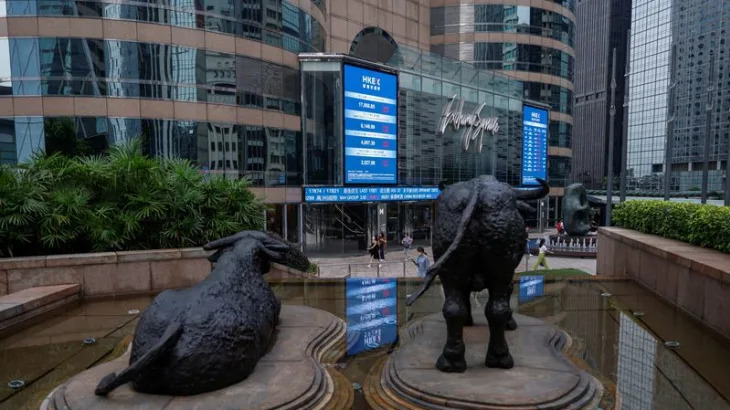(Bloomberg) -- As a growing chorus of bankers and politicians around the world demand the roll-back of crisis-era regulations, Nick Leeson — the former rogue derivatives trader who brought down one of the UK’s most venerated financial institutions — is starting to get worried.
Leeson, whose illicit trades sparked the collapse of 230-year-old Barings Bank and sent him to prison for four years, said he fears that in its push to keep pace with US President Donald Trump’s deregulation drive, the UK could face some unforseen risks to its financial stability.
“You’ve got to be very, very careful when people talk about deregulation,” Leeson said in a Bloomberg Radio interview. “It’s going to open certain doors to allow things to go wrong again.”
This month marks thirty years since Leeson had amassed trading losses of about $1.4 billion when working for Barings in Singapore in 1995, leading to the bank’s failure and eventual sale to ING Groep NV for just £1. A film was made in 1999 based on his book about the scandal, starring Ewan McGregor.
Leeson ultimately served about four years in Singaporean prison for attempting to cover up his bad trades.
In the ensuing decades, Leeson — who describes himself as London’s “original rogue trader” — has rebuilt his life, becoming a private investigator and a regular speaker on compliance at corporate events. And he’s watched from afar as other rogue traders have made headlines. Kweku Adoboli, for instance, was imprisoned over a $2.3 billion loss at UBS Group AG, while Jerome Kerviel was convicted of causing a massive trading loss at Societe Generale SA.
Just three months ago, UK authorities fined Macquarie Bank Ltd.’s British unit £13 million ($16.42 million) after a junior trader on the firm’s London metals desk was able to book 426 fictitious trades to conceal his losses for almost two years. Macquarie itself lost $57.8 million after unwinding the positions.
Despite these scandals, Leeson says lenders’ compliance arms have come a long way since his days.
“When I think back to my time at Barings, we had one compliance officer, and I think she was also the risk manager for 2,500 people,” he said. “You walk into most offices now in Canary Wharf or around this area, and there’s 3,000 people working in compliance. The quality of people are better, they’re better educated, they’re getting better training.”
That’s why Leeson is watching with interest as Trump has slashed regulation and sought to overhaul his country’s financial watchdogs, moves that have emboldened finance executives around the world to demand their own governments do similar or risk falling behind.
“Macquarie is the one that worries me,” he said. “It’s just so basic. This is like kids’ stuff. I think Macquarie is an isolated incident but, you know, one incident is too many.”
In November, Macquarie said the unauthorized trading was isolated to one individual and did not affect clients. “No financial benefit or gain was derived by Macquarie or any other party directly from the activity,” the bank said in a statement.
Leeson also acknowledged that, in some instances, the crackdown on banks in the aftermath of the 2008 global financial crisis might have gone too far, such as some of the more onerous regulations included in the US’s Dodd-Frank Act, which overhauled banking oversight when it became law in 2010.
“That restricted a lot of business getting done,” Leeson said. “And there's definitely a need to pull back a little bit on that.”
Here are excerpts from the conversation with Leeson that have been edited and condensed for length and clarity:
Q: What are your views today of the collapse of Barings?
A: “People have asked me if I’m comfortable or content with that particular period in my life. I never will be because it’s the complete opposite of what I wanted to achieve. Am I content with myself? Yes, what I represent, my family values and everything else, but the focus is very different. It’s not on being successful and succeeding within the world of finance, which is what I wanted to do. You have to change your focus a little bit and that enables you to move forward.”
Q: What advice would you give to another Nick Leeson who might be out there?
A: “Stop. You know, it’s not worth it. The one piece of advice I can give you is that it’s far easier to get another job. It’s not so easy to get another reputation. You’ve got to make the right decision on that basis. Unfortunately, my reputation might be slightly different than it was back in 1995 when this story came to everybody’s attention. But it’s still a bad reputation.”
Q: How have job opportunities changed in London’s financial services industry?
A: “It’s a far harder route these days. I started work in the city in 1985, you’ve got Big Bang shortly after. So they’ve got lots of new banks coming into the city, they’re all looking for staff. You used to get off the tube at Bank and you’d be handed one of those little magazines and it’d be full of jobs. And you could could quite easily change a job every couple of weeks if you wanted to with a tiny bit of experience.”
Q: What’s your assessment of the UK’s regulatory system today?
A: “It’s improved a lot but there needs to be more communication and conversations with the banks, they need to work together. Obviously I’m a million miles away from regulation these days but it’s still a job of work to be done. They’re always slightly behind the curve. If you look at the number of people who work in the Financial Conduct Authority and how many people work in the city of London, there’s a huge disparity. So it’s very difficult to man mark what’s going on within those organizations.”
Q: What advice do you give your corporate clients?
A: “If you find yourself in a difficult situation, always ask for help and advice. I was surrounded by people that could have helped me, but I didn’t do that really simple thing. It’s a very different world today than it was in 1990s. Asking for help was seen as a sign of weakness but I should have seen it as a sign of trying to do things correctly. I tell my children, if they find themselves in a difficult situation, just come to me and tell me what’s going on. There might be a difficult period but I’ll help you through it.”
--With assistance from James Woolcock.





